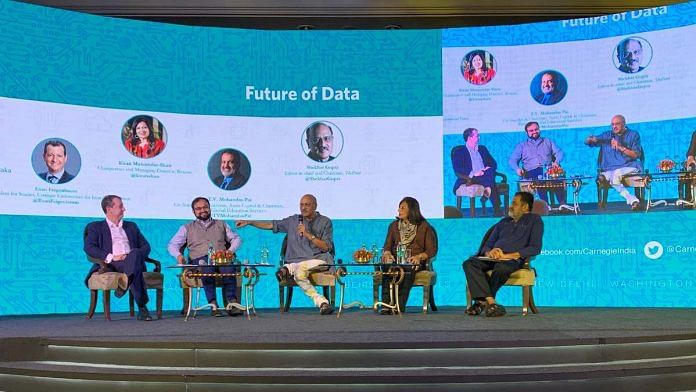New Delhi: Given the increasing misuse of data by multinational tech firms and “hostile” countries, there is an urgent need to facilitate “data nationalism” in India, according to T.V. Mohandas Pai, chairman of Manipal Global Education Services.
Speaking at a panel discussion on the ‘Future of Data’ at Carnegie India’s Global Technology Summit in Bengaluru Thursday, Pai said the idea of “data nationalism” means all the data that is generated in India should necessarily be stored within the country’s boundaries.
Pai was responding to a question by ThePrint’s Editor-in-Chief Shekhar Gupta, who was chairing the panel.
Evan Feigenbaum, vice-president for studies at the Carnegie Endowment for International Peace, Kiran Majumdar Shaw, MD of Biocon, and Alok Prasanna, senior resident fellow and team lead at Vidhi Karnataka, were the other members of the panel. ThePrint is a digital partner for the event.
‘Data can flow, but with consent’
Gupta opened the discussion by asking, “Is the future of data going to be driven by nationalism?”
In essence, he was inquiring whether ideas of nationalism — which are believed to represent a somewhat lack of openness to the world — would influence how one looks at questions about data in the near future.
Pai responded that there are rising concerns in society about data. “There is enormous power with people who have data, and they are using it to manipulate our minds,” he said.
Feigenbaum said there are charged debates now about the extent to which “governments harness data for their political purposes”. “It’s not just about what you do within your country, but your reach into other countries’ data,” said Feigenbaum.
Pai said data nationalism was the only way to deal with the problem of data security.
“We have our rights guaranteed under the Constitution… So, we need a sovereign to protect our data. And for the sovereign to protect our rights, the data needs to be in India. Only then the courts can protect your rights,” added Pai.
He went on say that data can be used by others and can even flow out of Indian borders, but only after the required consent is in place.
Also read: Small businessmen will soon get loans based on data, not balance sheets: Nandan Nilekani
What is the true value of data?
Over the past few years, a host of economists and business analysts claim that data is the most valued commodity in global markets.
“Does data really have as much value or are we exaggerating?” Gupta asked. “Is data the new oil?”
Responding to this question, Shaw said, “Data is one of the key drivers of economic growth. But it is less like oil and more like renewable energy.” She said what makes data unique is that it can be reused and recycled.
Prasanna added to the discussion by arguing that data was not like oil or any other normal commodity. “Data is not like oil. It is potentially infinite. And the more data you have, the more valuable it becomes,” he said.
Feigenbaum remarked that the value of data was not “just about quantity”. “Value comes from how you collect, harness, and process data. Much like labour, which becomes more valuable if it’s mobile,” he said.
‘Global declaration of data rights’
Amid growing concerns about international data security and rising competition between nation-states and companies over data, panellists talked about a need for global rules on data governance.
“We need a global declaration of data rights, much like the declaration of human rights,” said Pai, adding such a declaration would not only lay the norms for data privacy at the international level, it would also regulate tech monopolies that possess unchecked powers.
“The power of monopolies can be dangerous. If three of the biggest Chinese tech firms get together, who knows, maybe they can challenge the power of the Chinese govt,” remarked Prasanna.
Gupta asked: “In this world run by alpha-males of the nationalist-Right, how can we reach a global rules-based system of data governance?”
Feigenbaum said the “perfect should not become the enemy of good” in this case. “Any global agreement should aim to bring enough stakeholders, around enough themes. We need a functional agreement, even if it sets just the minimum standards.”
Also read: The era of data-globalism is over. Where does this leave India?
Edited by Shreyas Sharma.



